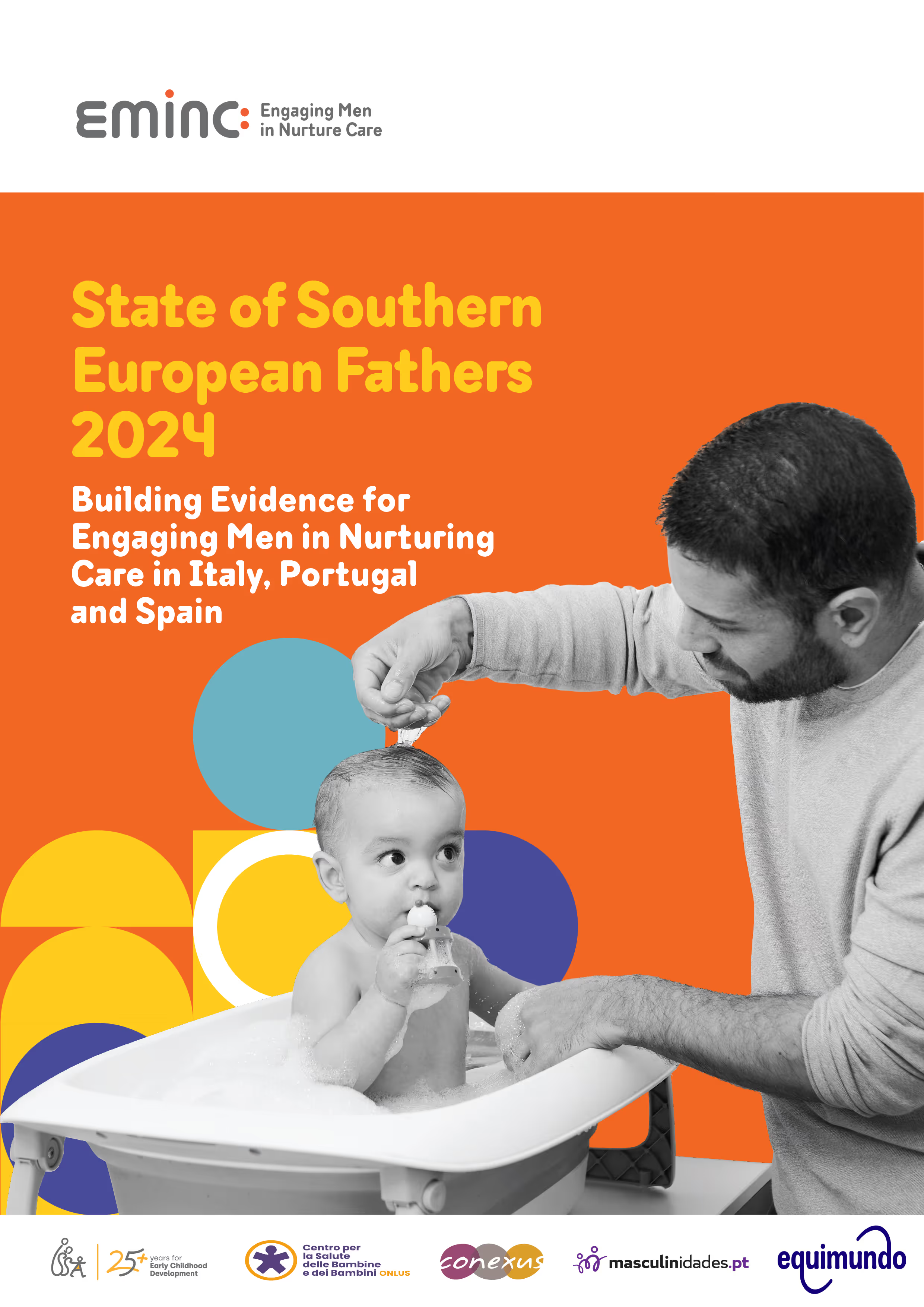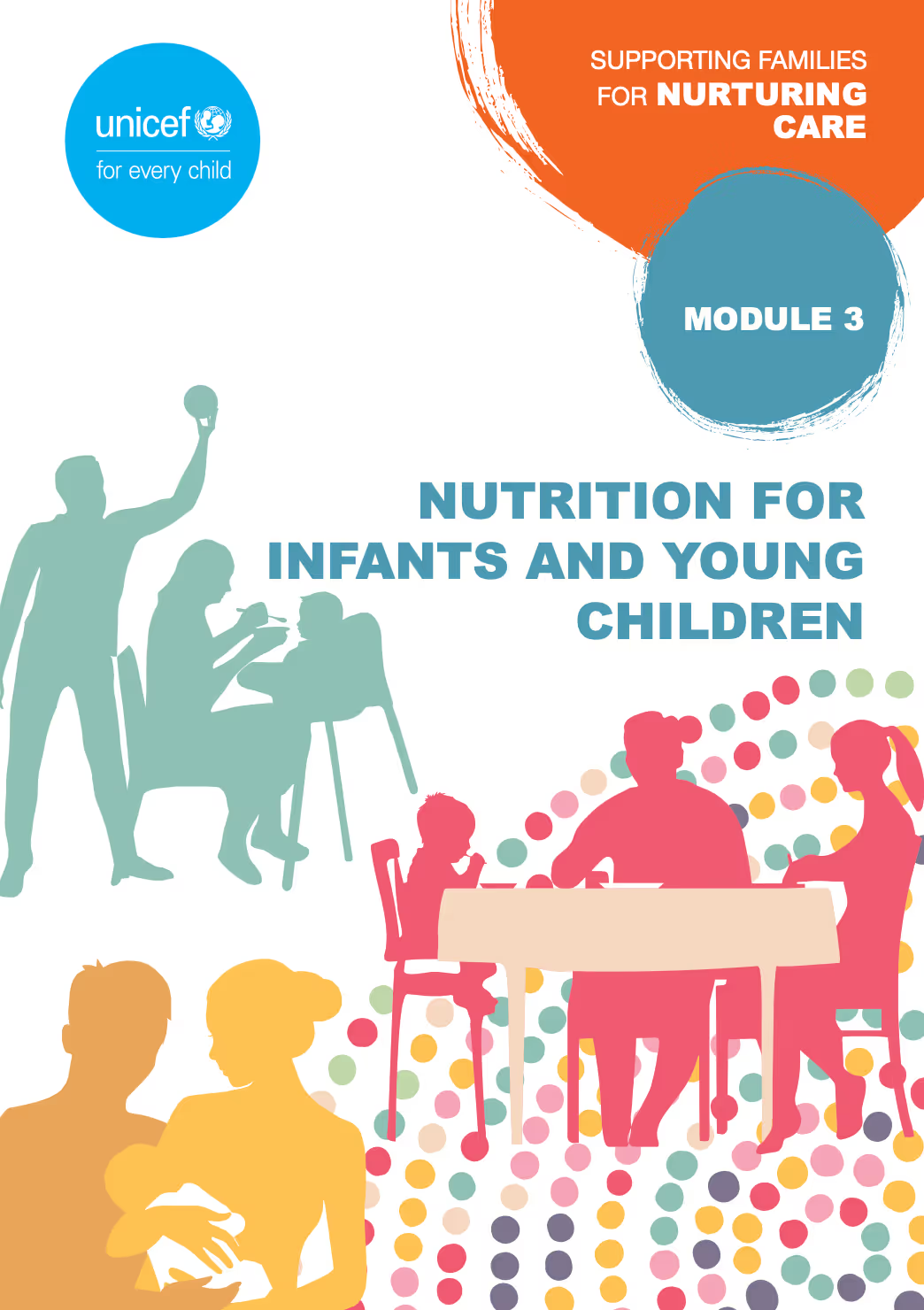State of Southern European Fathers 2024: Building Evidence for Engaging Men in Nurturing Care in Italy, Portugal, and Spain

The State of Southern European Fathers 2024 report, developed under the EMiNC initiative, explores fathers’ involvement in caregiving across Italy, Portugal, and Spain. While many men report active participation in daily care, a significant perception gap remains: 74% of fathers believe caregiving is equally shared, but only 51% of mothers agree. The findings show that mothers still carry the greater caregiving and household burden, often at the expense of their well-being and professional opportunities. At the same time, the report highlights the vital role fathers play in children’s development—greater involvement is linked to stronger emotional bonds, improved learning outcomes, and better long-term well-being for children.
Yet barriers persist: rigid workplace cultures, limited access to paid leave, and lack of affordable, quality childcare constrain men’s ability to participate equally. The report calls for robust policy reforms—such as fully paid, non-transferable leave for fathers—and investments in early childhood services that actively engage men. Public campaigns and local peer support networks are also essential to shift norms and expectations. Promoting men’s caregiving is not only a matter of gender equality, it is a key strategy to ensure all children thrive from the very start.
The report, developed under the EMiNC initiative, explores fathers’ involvement in caregiving across Italy, Portugal, and Spain. While many men report active participation in daily care, a significant perception gap remains: 74% of fathers believe caregiving is equally shared, but only 51% of mothers agree. The findings show that mothers still carry the greater caregiving and household burden, often at the expense of their well-being and professional opportunities. At the same time, the report highlights the vital role fathers play in children’s development—greater involvement is linked to stronger emotional bonds, improved learning outcomes, and better long-term well-being for children.Yet barriers persist: rigid workplace cultures, limited access to paid leave, and lack of affordable, quality childcare constrain men’s ability to participate equally. The report calls for robust policy reforms—such as fully paid, non-transferable leave for fathers—and investments in early childhood services that actively engage men. Public campaigns and local peer support networks are also essential to shift norms and expectations. Promoting men’s caregiving is not only a matter of gender equality, it is a key strategy to ensure all children thrive from the very start.
Read more

Supporting families for nurturing care: Training resource package for home visiting practices
This training package equips trainers of home visiting professionals with essential knowledge, skills, and tools to deliver consistent, high-quality pre-service and in-service training.
Developed by UNICEF ECARO and the International Step by Step Association (ISSA), it builds on almost ten years of collaboration and earlier home visiting modules (2017–2025). The goal is to strengthen home visiting as a key community health service supporting families from pregnancy to early childhood.
The package includes three guides: General Overview, Foundational Training, and Extended Training, each offering adaptable materials such as session plans, slides, and handouts based on nurturing and family-centered care.
It combines two main areas: (1) programmatic knowledge on child development, health, nutrition, and parental wellbeing, and (2) practical skills such as communication, relationship building, observation, problem-solving, and cultural responsiveness.
Grounded in adult learning principles, the training encourages reflection, peer learning, and practical application, fostering the professional growth of trainers and home visitors while improving the quality of home visiting services.
Trainer Guide: General Overview
Trainer Guide: Foundational Training
Trainer Guide: Extended Training
button[src="https://cdn.prod.website-files.com/694724257114b734f4bb749a/6985cff74ab2bbd98fabe605_SUPPORTING%20FAMILIES%20FOR%20NURTURING%20CARE%20Training%20Resource%20Package%20for%20Home%20Visiting%20Practices_0.pdf"][label="Download the Resource Package"] button[src="https://clearinghouse.unicef.org/sites/ch/files/ch/teams-ECARO-Planning-ECA%20Knowledge%20at%20UNICEF-Guide%201.General%20Overview-2.0.pdf"][label="Trainer Guide: General Overview"] button[src="https://clearinghouse.unicef.org/sites/ch/files/ch/teams-ECARO-Planning-ECA%20Knowledge%20at%20UNICEF-Guide%202.Foundational%20training-2.0.pdf"][label="Trainer Guide: Foundational Training"] button[src="https://clearinghouse.unicef.org/sites/ch/files/ch/eams-ECARO-Planning-ECA%20Knowledge%20at%20UNICEF-FT_2025_PowerPoints_Day_I%20-2.0.pptx"][label="PPT"] button[src="https://clearinghouse.unicef.org/sites/ch/files/ch/teams-ECARO-Planning-ECA%20Knowledge%20at%20UNICEF-FT_2025_PowerPoints_Day_I%20-2.0.pdf"][label="PDF"] button[src="https://clearinghouse.unicef.org/sites/ch/files/ch/eams-ECARO-Planning-ECA%20Knowledge%20at%20UNICEF-FT%202025_PowerPoints_Day%20II-2.0.pptx"][label="PPT"] button[src="https://clearinghouse.unicef.org/sites/ch/files/ch/teams-ECARO-Planning-ECA%20Knowledge%20at%20UNICEF-FT%202025_PowerPoints_Day%20II-2.0.pdf"][label="PDF"] button[src="https://clearinghouse.unicef.org/sites/ch/files/ch/eams-ECARO-Planning-ECA%20Knowledge%20at%20UNICEF-FT%202025_PowerPoints_Day%20III-2.0.pptx"][label="PPT"] button[src="https://clearinghouse.unicef.org/sites/ch/files/ch/teams-ECARO-Planning-ECA%20Knowledge%20at%20UNICEF-FT%202025_PowerPoints_Day%20III-2.0.pdf"][label="PDF"] button[src="https://clearinghouse.unicef.org/sites/ch/files/ch/eams-ECARO-Planning-ECA%20Knowledge%20at%20UNICEF-FT%202025_PowerPoints_Day%20IV-2.0.pptx"][label="PPT"] button[src="https://clearinghouse.unicef.org/sites/ch/files/ch/teams-ECARO-Planning-ECA%20Knowledge%20at%20UNICEF-FT%202025_PowerPoints_Day%20IV-2.0.pdf"][label="PDF"] button[src="https://clearinghouse.unicef.org/sites/ch/files/ch/eams-ECARO-Planning-ECA%20Knowledge%20at%20UNICEF-FT%202025_PowerPoints_Day%20V-2.0.pptx"][label="PPT"] button[src="https://clearinghouse.unicef.org/sites/ch/files/ch/teams-ECARO-Planning-ECA%20Knowledge%20at%20UNICEF-FT%202025_PowerPoints_Day%20V-2.0.pdf"][label="PDF"] button[src="https://clearinghouse.unicef.org/sites/ch/files/ch/teams-ECARO-Planning-ECA%20Knowledge%20at%20UNICEF-Guide%203.Extended%20training-2.0.pdf"][label="Trainer Guide: Extended Training"] button[src="https://clearinghouse.unicef.org/sites/ch/files/ch/eams-ECARO-Planning-ECA%20Knowledge%20at%20UNICEF-ET%20Day%20I-2.0.pptx"][label="PPT"] button[src="https://clearinghouse.unicef.org/sites/ch/files/ch/teams-ECARO-Planning-ECA%20Knowledge%20at%20UNICEF-ET%20Day%20I-2.0.pdf"][label="PDF"] button[src="https://clearinghouse.unicef.org/sites/ch/files/ch/eams-ECARO-Planning-ECA%20Knowledge%20at%20UNICEF-ET_Day%20II%20merged-2.0.pptx"][label="PPT"] button[src="https://clearinghouse.unicef.org/sites/ch/files/ch/teams-ECARO-Planning-ECA%20Knowledge%20at%20UNICEF-ET_Day%20II%20merge-2.0.pdf"][label="PDF"] button[src="https://clearinghouse.unicef.org/sites/ch/files/ch/eams-ECARO-Planning-ECA%20Knowledge%20at%20UNICEF-ET_Day%20III%20merged-2.0.pptx"][label="PPT"] button[src="https://clearinghouse.unicef.org/sites/ch/files/ch/teams-ECARO-Planning-ECA%20Knowledge%20at%20UNICEF-ET_Day%20III%20merge-2.0.pdf"][label="PDF"]Published in:
2025
Organization(s):
ISSA, UNICEF ECARO
Language:
Contact:
Ayca Alayli, aalayli@issa.nl

Module 3: Nutrition for Infants and Young Children
The Module 3 ‘Nutrition for Infants and Young Children’ is intended to support home visitors and other health professionals in providing advice and support to parents and families on infant and young child nutrition. It includes three modules:
Module 3b: ‘Introducing Complementary Foods’
Module 3c: ‘Nutrition of Children Aged 2-6 Years’
You can access the whole package here.
button[src="https://cdn.prod.website-files.com/694724257114b734f4bb749a/6985cf735eb0b715b71d6271_3a.Nutrition-BreastfeedingNEWBORN-ENG-WEB.pdf"][label="Download 3a. Breastfeeding"] button[src="https://cdn.prod.website-files.com/694724257114b734f4bb749a/6985cf743139d7275e743a0a_3b.Nutrition-InfantYoungChild-ENG-WEB.pdf"][label="Download 3b. Introducing Complementary Foods"] button[src="https://cdn.prod.website-files.com/694724257114b734f4bb749a/6985cf766ca73e3f96db4776_3c.Nutrition-YoungChild2-6-ENG.pdf"][label="Download 3c. Nutrition of Children Aged 2-6 Years"]
Published in:
2025
Organization(s):
UNICEF ECARO & ISSA
Language:

Men's and Father's Engagement in Nurturing Care: Compendium of Good and Promising Practices
This compendium, developed under the Engaging Men in Nurturing Care Initiative (EMiNC), provides an overview of programs that promote men’s and fathers’ engagement in nurturing care during early childhood, shared parenting, and child-rearing responsibilities. These programs aim to transform how professionals work with parents and young children while fostering responsive caregiving that encourages men’s involvement.
The compendium compiles evidence across early childhood sectors to support advocacy efforts at the European level under EMiNC. The initiative seeks to address social norms, workplace and home realities, and policies that hinder male engagement. EMiNC’s advocacy strategy aims to raise awareness among policymakers and decision-makers about the benefits of men’s participation in formal and informal nurturing care for children, families, and society. It also seeks to influence public discourse on gender equality to encourage greater male involvement in caregiving.
By showcasing effective and promising practices, the compendium highlights the importance of strengthening programs and services that promote men’s participation in nurturing care. It also underscores the need to expand access to quality early childhood education and care (ECEC) services, in line with the revised Barcelona targets for 2030 (Council of the European Union recommendations on early childhood education and care), as a policy measure to support equal employment opportunities for men and women.
button[src="https://cdn.prod.website-files.com/694724257114b734f4bb749a/6985cf50028979a5a000ce26_Men%20in%20Care_ISSA_Compendium-2.pdf"][label="Download in English"]Published in:
2025
Organization(s):
ISSA
